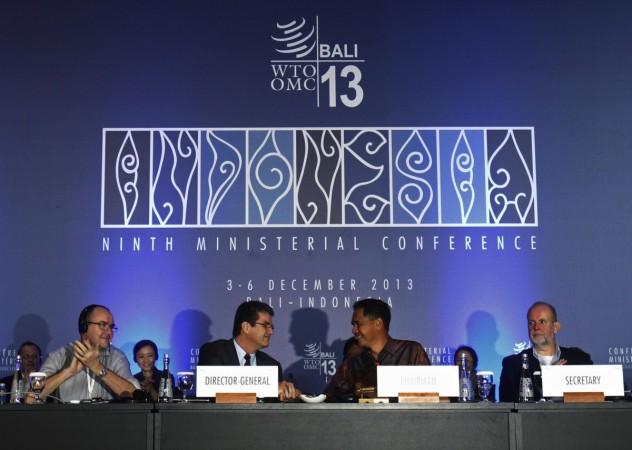
As India refused to sign the World Trade Organisation's customs deal ahead of Thursday's deadline, the diplomats would come up with options to move ahead with the deal after the summer break.
Refusing to sign the WTO Trade Facilitation Agreement (TFA) on Thursday, India proposed a broader alternative to its earlier demand of increasing the allowance to stockpile food grains.
"We have made a new proposal to WTO" within the "broader contours of what we had proposed earlier," Economic Times quoted Commerce Secretary Rajeev Kher.
"The Bali deal won't collapse if we do not sign the trade facilitation by tonight," he said ahead of the deadline yesterday.
After India's stance on the deal on Thursday, the experts think that the decisions on global trade agreements are likely to be left on a few nations, who would want to have liberalised trade.
"Today's developments suggest that there is little hope for truly global trade talks to take place. The vast majority of countries who understand the importance of modernizing trade rules and keeping their promises will have to pick up the pieces and figure out how to move forward," Reuters quoted Jake Colvin.
A group of World Trade Organisation members have already discussed excluding India and going ahead with the agreement on custom rules, according to reports.
Some nations, who fear that India's take on WTO agreement could cause a threat to the "process of world trade liberalisation", are already thinking about excluding India from this deal.
"If India does not end up blocking (on Thursday) there is already a group of members who are interested in pursuing that path," Mint quoted an unnamed source who attended the discussion.
However, some diplomats are of the view that India's approval and cooperation in the deal is important, as the agreement has to go through an amendment to the existing WTO treaty.
The Australian official stated that the option to go ahead with the WTO agreement as a plurilateral deal - where a few members participate in the agreement while the rest participate as observers - might be considered, once the summer break is over and the WTO diplomats returns.
"Some of the material we've seen come out overnight suggests the plurilateral option may indeed now be on the table," the official said.
"What began as a murmur has become a much more active discussion in Geneva and I think that there are a lot of members in town right now that have reached the reluctant conclusion that [plurilateral deal] may be the only way to go," he added.
The deal, which is to be signed in Geneva on Thursday, would contribute $1 trillion to the global economy and help boost 21 million jobs.
"Some of the material we've seen come out overnight suggests the plurilateral option may indeed now be on the table," the official said.
"What began as a murmur has become a much more active discussion in Geneva and I think that there are a lot of members in town right now that have reached the reluctant conclusion that [plurilateral deal] may be the only way to go," he added.















